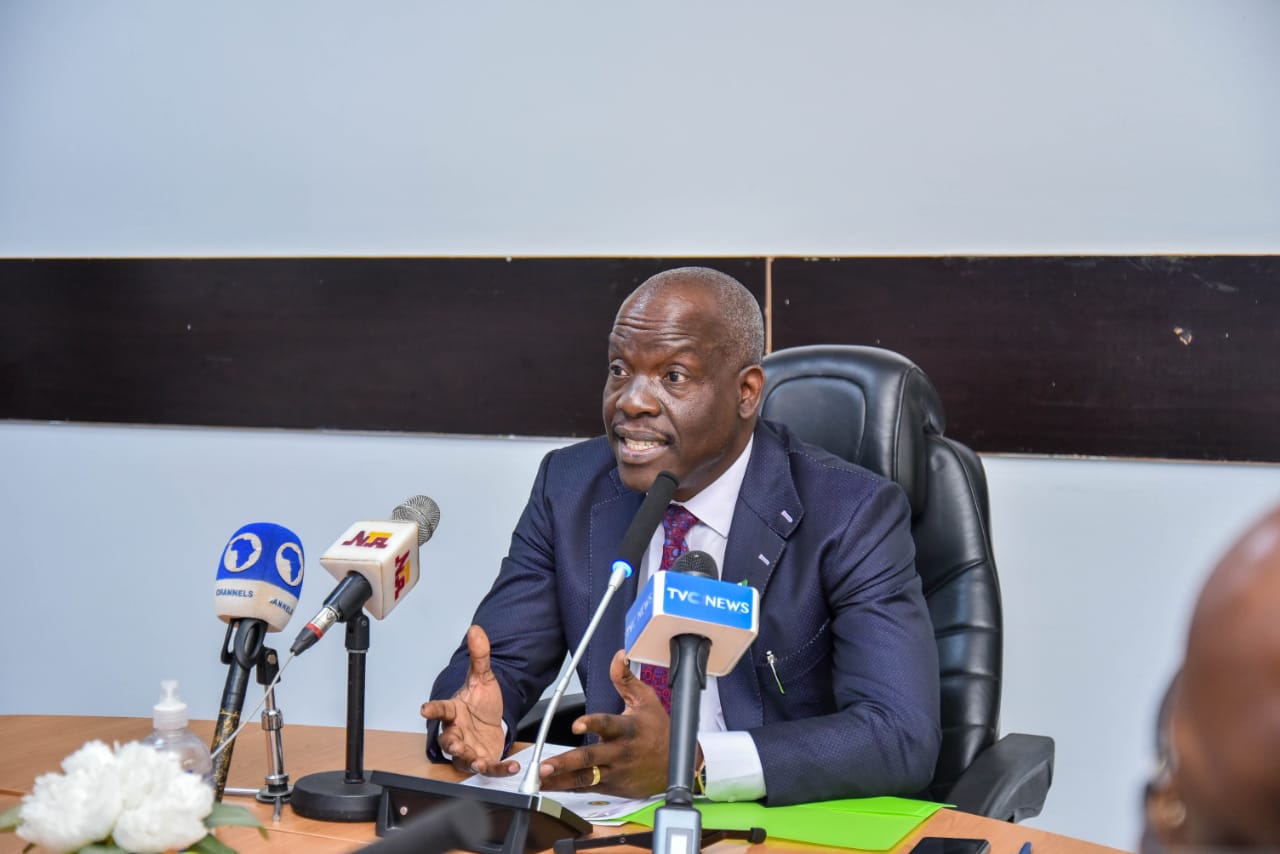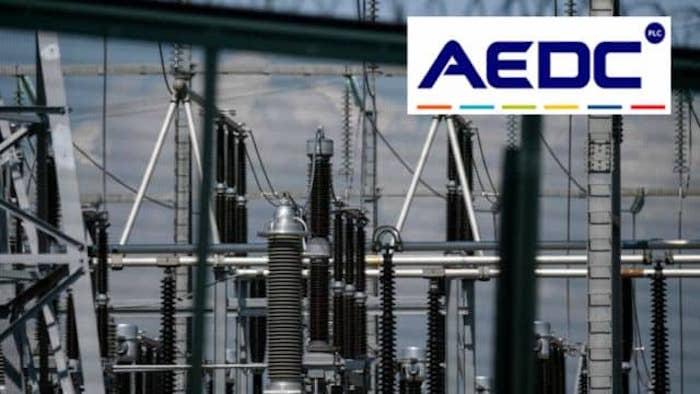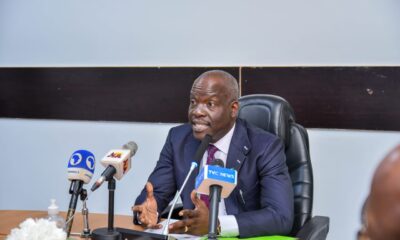Energy
Nigeria produces average of 1.33m barrels of oil per day — CEO NUPRC

…Says oil, gas reserves in Nigeria represent 30-34 % of African reserves
By Matthew Denis
The Chief Executive Officer of the Nigerian Upstream Regulatory Commission (NUPRC), Engineer Gbenga Komolafe has stated that the actual national production currently averages 1.33 Million barrels of oil per day and 256 thousand barrels of condensate per day.
He made the disclosure while delivering his welcome address at the 8th Sub-Saharan Africa International Petroleum, Exhibition and Conference (SAIPEC) held in Lagos on Tuesday.
Engr. Komolafe said the theme, ‘The Next Steps: Accelerating African Content,’ is in right direction for the conference noting that the global energy landscape is indeed currently in a state of rapid change in response to climate concerns.
“As a result, the oil and gas industry is experiencing crucial changes that will have significant bearing on the global energy future. In the recently concluded COP28, suggestions on pathways for phasing-out fossil fuels were vehemently challenged by OPEC+ as the cartel reiterated its call for just, inclusive, equitable and balanced energy transition. Moreso, His Excellency, President Bola Tinubu, GCFR, at the United Nations General Assembly (UNGA) in September 2023, underscored the need to align Africa’s transition pathway with the continent’s circumstances and overall economic pursuit
The CEO stressed that the Agenda for Nigeria, and other resource rich developing economies, is that the evolving energy dynamics must be calibrated to ensure energy justice, equity, inclusivity, and sustainability.
“The new dynamics in the global energy arena necessitate that Nigeria, and other countries, long dependent on the exploitation of oil and gas as the mainstay of their economies, re-examine their strategy to secure a blossoming energy future while meeting the global climate goals.
“Hence, for Nigeria, the legal, governance, fiscal and regulatory frameworks provided in the Petroleum Industry Act, 2021 (PIA), amongst several objectives, aim to promote transparency, efficiency, and innovation for sustainable development of national hydrocarbon resources as well as renewable energy investment to meet the global environmental sustainability goals.
“The oil reserves and gas reserves in Nigeria respectively represent 30% and 34% of the African oil and gas reserves. Although the actual national production currently averages 1.33 Million barrels of oil per day and 256 thousand barrels of condensate per day, the national technical production potential currently stands at 2.26 Million bpd, and the current OPEC quota is 1.5 Million bopd.
“Thus, the Commission is taking strategic measures to arrest some challenges confronting us in order to boost production and meet the potential. These include: Measures to improve transparency in hydrocarbon measurement and accounting, Collaborative work programme administration with the E & P companies, and close monitoring to ensure that they meet their work programme obligations.”
According to him other factors are acceleration of field developments (FDPs) through timely approvals and ensuring speedy execution, Production optimisation by ensuring wells are tested periodically and produced at optimal rates, Identifying candidate wells for workover and interventions and Adoption of Enhanced Oil Recovery processes and technologies.
The NUPRC boss emphasised that aside from hydrocarbon resources, Nigeria is blessed with potentials for green and blue hydrogen, solar, wind, biomass and critical minerals for development of clean energy technologies as well as growing population predominated by young people.
With a coastline along the Gulf of Guinea, a market size of more than 200 million people projected to reach between 390 million and 440 million people in 2050, Nigeria represents hope for Africa.
“Interestingly, about 70 percent of the Nigerian population are under 30, and 42 percent are under the age of 15 [Source: National Population Commission] representing a huge economic asset. Indeed, Nigeria’s potentials are derived from its human, natural and material resources which must be mobilised to propel her on a path of economic growth and development and for her sustainable energy future.
He said that as a country, Nigeria is also on track to meet its environmental stewardship obligations. Analysis of the EU’s EDGAR database shows that Nigeria occupies a distant 165th position in the global ranking of top emitters, with a GHG emissions per capita at 1.88 tonnes CO2 equivalent per capita per year, representing just 0.13 percent of the global total.
“Despite the low emissions, we are not resting on our oars. The Nigerian Upstream Petroleum Regulatory Commission is effectively spearheading the national drive to achieve zero-flare target by 2030 and net zero carbon emissions by 2060 through several initiatives including a unique flare commercialisation programme – the NGFCP.”
He revealed that with over 125 billion barrels of oil and 620 trillion cubic feet of natural gas reserves as well as other natural resource potentials, Africa is richly endowed with resources, “but we must re-examine our strategies and respond through deliberate policies and programmes that suit our regional circumstances given the evolving global energy landscape. Accordingly, the time has come for African Petroleum Regulatory Agencies to come together to discuss our common challenges with a view to achieving our common objectives.”
“At the heart of this vision is the need to establish the African Petroleum Regulatory Forum (AFRIPERF) to work collaboratively in shaping the regulatory landscape of Africa as well as have a unified voice for stronger and more influential representation on the global stage.
“It is our hope that the framework for the AFRIPERF engagement will be set-up in the course of this Conference to set the stage for future periodic meetings that will culminate in numerous benefits including entrenching best practices and regulatory stewardship, facilitating knowledge sharing and technology transfer, attracting investment and enhancing global competitiveness.”
Energy
Divestments: Shell assets estimated at 4.96 billion barrels oil reserve – NUPRC


The Nigerian Upstream Petroleum Regulatory Commission (NUPRC) says the Shell Petroleum Development Company of Nigeria Limited (SPDC) assets being considered for divestments have an estimated reserve of 4.96 billion barrels of oil.
The Commission Chief Executive of NUPRC, Mr Gbenga Komolafe disclosed this on Monday in Abuja at the NUPRC-SPDC due diligence divestment workshop.
Komolafe said at the workshop that the assets have reserves of 1.77 billion barrels of condensate, 28.16 trillion cubic feet of associated gas and 28.11 trillion cubic feet of non-associated gas.
The workshop was aimed at discussing the proposed divestment of the participating interests held by SPDC in the SPDC JV Assets, through a sale by the shareholders of all the issued shares of SPDC to Renaissance Africa Energy Company Limited.
The SPDC JV assets are currently operated by the SPDC on behalf of its Joint Venture (JV) partners namely Nigeria National Petroleum Company Limited (NNPC Ltd.), Total Upstream Nigeria Limited, Nigeria Agip Oil Company and SPDC.
“To date, the assets have achieved a cumulative production of 5.35 billion barrels of crude oil, 165. 57 million barrels of condensate, 9.51 trillion cubic feet of associated gas and 3.75 trillion cubic feet of non-associated gas.
“These contribute to the achievement of Nigeria’s crude and condensate output.
“The assets being considered have an estimated total reserve of 4.96 billion barrels of oil, 1.77 billion barrels of condensate, 28.16 trillion cubic feet of associated gas and 28.11 trillion cubic feet of non-associated gas.
“This makes a significant contribution to the nation’s hydrocarbon resources.
“Additionally, these assets hold P3 reserves estimated at 2.85 billion barrels of oil, 850.85 million barrels of condensate, 11.3 trillion cubic feet of associated gas and 12.26 trillion cubic feet of Non-Associated Gas,” he said.
Komolafe said the due diligence meeting would enable the commission to identify a successor who would not only possess the requisite financial resources but also demonstrate the technical expertise to responsibly manage these assets throughout their lifecycle.
He further said that the commission would ensure that the inherent environmental and end-of-life liabilities such as decommissioning liabilities were accurately identified and assigned to the party best equipped to bear the associated risks.
This, he said would necessitate a comprehensive understanding of regulatory requirements, industry best practices and the unique challenges inherent in oil and gas operations.
“To this end, we have implemented robust measures to streamline regulatory procedures and eliminate unnecessary barriers to investment.
“Let me emphasise that the NUPRC wholeheartedly welcomes investment in the Nigerian upstream petroleum sector.
“We recognise the critical role investment plays in driving innovation, creating employment opportunities and ultimately fueling economic prosperity for our nation and its people.
“Therefore, we are always eager to welcome local and international investors who choose to invest in the Nigerian upstream petroleum sector,” he said.
He added that the commission was fully committed to facilitating and supporting investment initiatives that align with national development goals.
Komolafe urged SPDC and Renaissance to engage proactively, adhere to regulatory requirements and work collaboratively with the NUPRC to ensure the successful conclusion of the Shell Divestment.
“As regulators, we will ensure that this evaluation is conducted with precision and impartiality, with a focus on transparency and accountability,” he said.
He lauded President Bola Tinubu for his support and commitment towards ensuring a purposeful leadership that would attract investment and development of the country’s oil and gas sector.
The News Agency of Nigeria (NAN) reports that the NUPRC has developed a Divestment Framework consisting of seven cardinal pillars to guide the assessment of applications for Ministerial consent to the SPDC divestments and other similar divestments
Energy
NUPRC develops framework to guide Shell divestment, others


The Nigeria Upstream Petroleum Regulatory Commission (NUPRC) has developed a divestment framework to guide the assessment of applications for ministerial consent to the Shell Petroleum Development Company of Nigeria Ltd. (SPDC) divestment.
The NUPRC said the framework with seven cardinal pillars would also guide other similar divestments in the country.
The commission’s Chief Executive, NUPRC, Mr Gbenga Komolafe, said this at the NUPRC-Shell Petroleum Development Company of Nigeria Ltd. divestment workshop on Monday in Abuja.
The due diligence workshop aimed at discussing the proposed divestment of the participating interests in the SPDC JV Assets, through a sale by its shareholders of all the issued shares of the SPDC to Renaissance Africa Energy Company Ltd.
The SPDC JV assets are currently operated by the SPDC on behalf of its Joint Venture (JV) partners, namely, Nigerian National Petroleum Company Limited (NNPC Ltd.), Total Upstream Nigeria Limited, Nigeria Agip Oil Company and SPDC.
SPDC JV OMLs were originally awarded as Oil Exploration Licence -1(OEL-1) on Jan. 1, 1949, covering the whole of southern Nigeria and Cameroon.
Ultimately, the assets were converted to OMLs in April 1962 and subsequently renewed in 2014 and 2018 for 20 years.
Komolafe listed the cardinal pillars to include technical capacity, financial, legal, decommissioning and abandonment (D&A), host community trust /environmental remediation fund, industrial relations and labour issues and data repatriation.
On technical capacity, he said the successor entity must demonstrate verifiable capacity to operate the asset vigorously, while the NUPRC shall assess the prospective successor’s financial viability to undertake a defined programme and fulfil required obligations on the assets.
On the legal framework, he said the acquiring entity must be ‘fit and proper’ persons in the eyes of the law.
He added that clear evidence of resolutions of legacy debts and legal encumbrances must be established.
“Applicable decommissioning and abandonment costs must be diligently assessed and ensure settlement of outstanding obligations. Commission will ensure that potential exposure of the Nigerian government to decommissioning liabilities is averted.
“The commission shall assess the status of Host Community Trust Fund obligations and ensure the robustness of the successor entity’s adherence to decarbonisation plans and sound Environmental Social & Governance principles.
“The commission shall implement a robust assessment mechanism to avert undesirable labour union issues and disharmony arising from the divestment process.
“Concerned parties shall endorse a “Certificate of Settlement” to validate alignments reached on all labour issues (staff welfare, benefits, entitlements as well as disengagement, redundancies and retirement, among others).
“The aim is to ensure the nation averts socioeconomic disruptions arising from failure to resolve labour issues that might result because of post-divestment,” he said.
On data repatriation, the CCE emphasised that the commission would ensure that all data mined during the operating life of the asset were repatriated to the National Data Repository in line with extant regulations.
Komolafe, however, emphasised that the NUPRC would remain committed to free entry, free exit business principle aimed at encouraging investors in the sector.
Mr Wessel de Haas, General Manager, SPDC Assets and Deputy Managing Director, reiterated the significant contribution the company had made and expected to make in the future, toward Nigeria’s economic growth.
He anticipated a favourable outcome from the workshop with expectation of a due diligence process to finalise the divestment.
Energy
Power outage in FCT due to technical fault on some feeders – AEDC


The Abuja Electricity Distribution Company (AEDC), has attributed the power outage currently being experienced in parts of Abuja to technical fault on some of its feeders
The company’s management in a statement on Monday in Abuja listed the feeders affected as L36, H23, H33 and 8.
“This is to inform residents in parts of Abuja that the power outage currently being experienced is due to technical fault on feeders L36, H23, H33 and 8 respectively.
“Locations affected: are feeder L36-Entire Idu industrial, CITEC Estate, Efab Global, Babaginda Estate, Nizamaye Hospital and its environs.
“FH 23-Airport, River Park, Shoprite, NIPCO, Dunamis Church, NIGCOMSAT and its environs,’’ it said.
The company said that Feeder FH33 was also affected and this comprises Apo Mechanic Village, Waru Village and its environs
The company also said that Feeder 8 which has Jabi, Parts of Utako, Life Camp, Kado, Efab, Zango Daura, and Mbora Estates and its environs was also affected.
According to AEDC, its technical team is working tirelessly to rectify the fault and restore power supply as quickly as possible and regrets any inconvenience caused.
-
capital market2 years ago
Rt.briscoe, FBNH, Others halts negative performance of stock market
-
Finance3 months ago
Court orders Sen. Victor Umeh to repay N136m bank debt to AMCON
-



 Abuja Update2 months ago
Abuja Update2 months agoUNDP, FG partnership needed to achieve inclusion, equity- Minister
-
Abuja Update1 month ago
Banks drive stock market performance with N147bn gain
-



 Health3 weeks ago
Health3 weeks agoCapacity training will reduce migration of health workers- NPHCDA
-



 Business2 weeks ago
Business2 weeks agoTingo Group unveils Tingo Electric, Tingo Cola drink at Lagos launch
-



 Infotech1 month ago
Infotech1 month agoWorld Backup Day: NITDA urges Nigerians to ensure backup of data
-
News4 months ago
Oil thieves sponsoring malicious media campaign against Navy – Spokesman








